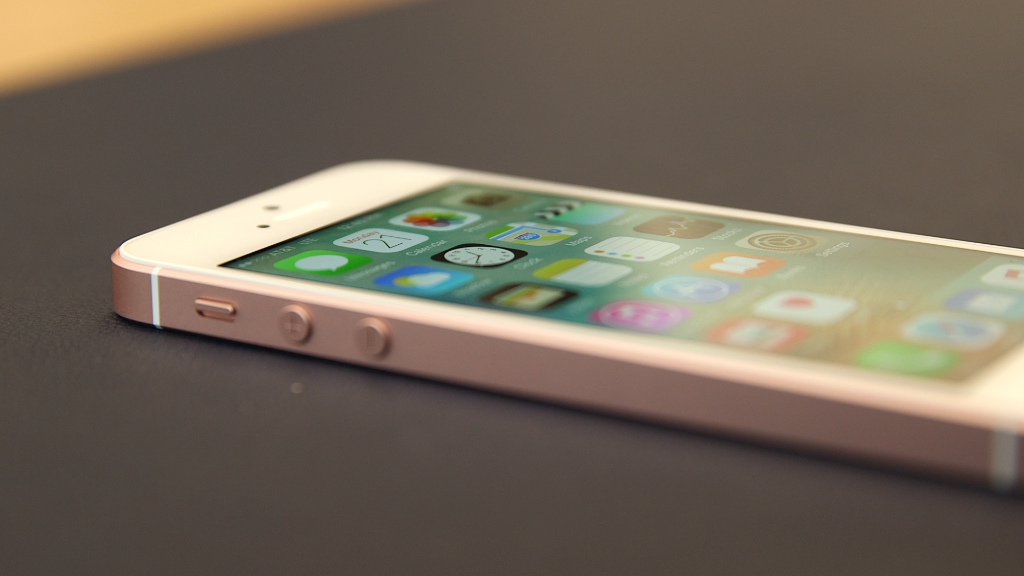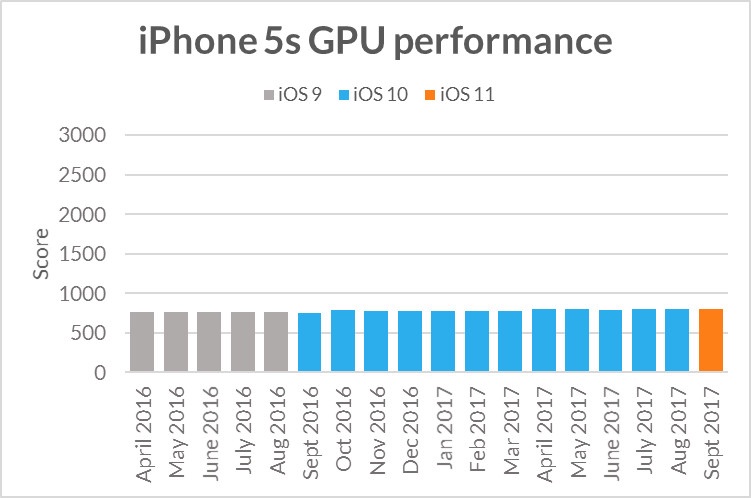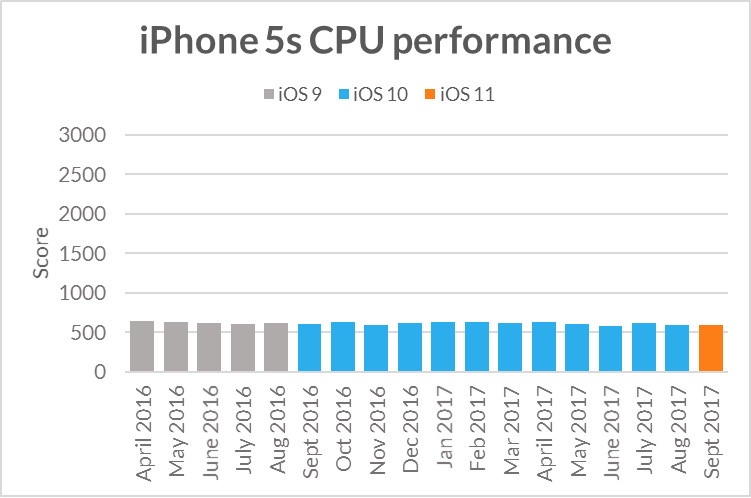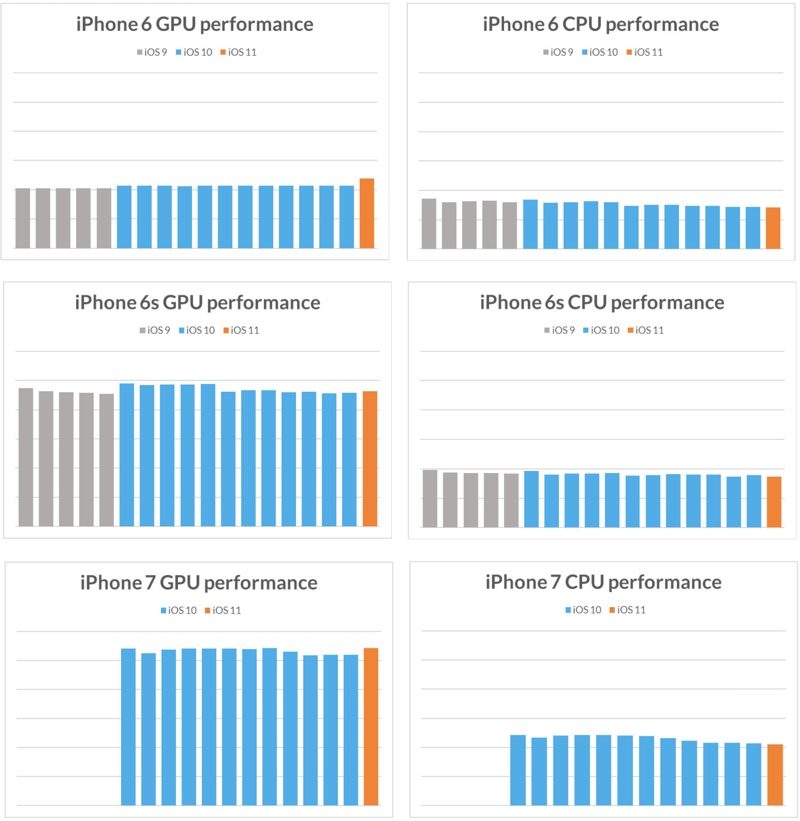According to benchmarking company, Futuremark recently set out to debunk long-running speculation that Apple is intentionally slowing down ...
According to benchmarking company, Futuremark recently set out to debunk long-running speculation that Apple is intentionally slowing down older iPhones to encourage upgrades, with analysis of benchmark results indicating iPhones maintain their performance over time instead of deteriorating.
Starting in 2016, Futuremark collected over 100,000 benchmark results for seven different iPhone models across three versions of iOS, using that data to create performance comparison charts to determine whether there have been performance drops in iOS 9, iOS 10, and iOS 11.
The first device tested was the iPhone 5s, as it's the oldest device capable of running iOS 11. iPhone 5s, released in 2013, was the first iPhone to get a 64-bit A7 chip, and iOS 11 is limited to 64-bit devices. Futuremark used the 3DMark Sling Shot Extreme Graphics test and calculated all benchmark scores from the iPhone 5s across a given month to make its comparison.
Graph showing GPU performance reveals the average score has remained relatively stable between April 2016 and September 2017. The higher the bar, the better the performance, and based on the testing, GPU performance on the iPhone 5s has remained constant from iOS 9 to iOS 11 with just minor variations that Futuremark says "fall well within normal levels."
A similar story was found with the phone's CPU performance, its score barely changing between months, the most recent average falling just slightly when compared with the earliest record. As iPhone 5s CPU performance over time was measured using the 3DMark Sling Shot Extreme Physics test, and again, results were largely consistent.
Charts for other devices, including the iPhone 6, 6s, and 7, show some mild dips and increases when it comes to GPU performance. In the iPhone 6 and 7, GPU performance is up compared to previous-generation versions of iOS. As for iPhone 6s, There is a very modest decline in CPU performance, though with no significant score shifts.
The firm does note that there are some factors that may make users perceive a loss of performance after updating the operating system. Such as updates introducing new resource-intensive features, new apps developed for newer devices not running as smoothly, and older apps failing to take advantage of optimizations in later iOS releases. There's also a psychological effect of knowing that when new and improved model available, and these can make users think their device seem outdated."
Via MacRumors And 9to5Mac, Image Via Futuremark And CNNMoney
Starting in 2016, Futuremark collected over 100,000 benchmark results for seven different iPhone models across three versions of iOS, using that data to create performance comparison charts to determine whether there have been performance drops in iOS 9, iOS 10, and iOS 11.
The first device tested was the iPhone 5s, as it's the oldest device capable of running iOS 11. iPhone 5s, released in 2013, was the first iPhone to get a 64-bit A7 chip, and iOS 11 is limited to 64-bit devices. Futuremark used the 3DMark Sling Shot Extreme Graphics test and calculated all benchmark scores from the iPhone 5s across a given month to make its comparison.
Graph showing GPU performance reveals the average score has remained relatively stable between April 2016 and September 2017. The higher the bar, the better the performance, and based on the testing, GPU performance on the iPhone 5s has remained constant from iOS 9 to iOS 11 with just minor variations that Futuremark says "fall well within normal levels."
A similar story was found with the phone's CPU performance, its score barely changing between months, the most recent average falling just slightly when compared with the earliest record. As iPhone 5s CPU performance over time was measured using the 3DMark Sling Shot Extreme Physics test, and again, results were largely consistent.
Charts for other devices, including the iPhone 6, 6s, and 7, show some mild dips and increases when it comes to GPU performance. In the iPhone 6 and 7, GPU performance is up compared to previous-generation versions of iOS. As for iPhone 6s, There is a very modest decline in CPU performance, though with no significant score shifts.
Our benchmarking data shows that, rather than intentionally degrading the performance of older models, Apple actually does a good job of supporting its older devices with regular updates that maintain a consistent level of performance across iOS versions.
The firm does note that there are some factors that may make users perceive a loss of performance after updating the operating system. Such as updates introducing new resource-intensive features, new apps developed for newer devices not running as smoothly, and older apps failing to take advantage of optimizations in later iOS releases. There's also a psychological effect of knowing that when new and improved model available, and these can make users think their device seem outdated."
Via MacRumors And 9to5Mac, Image Via Futuremark And CNNMoney













COMMENTS